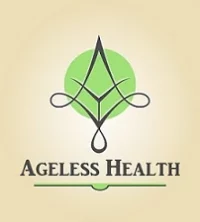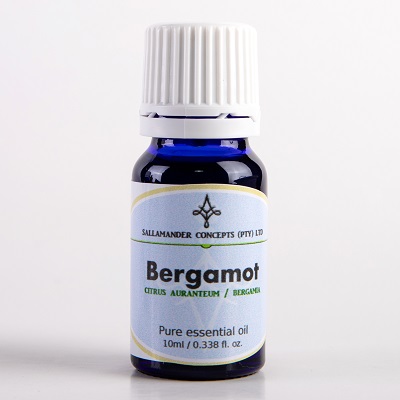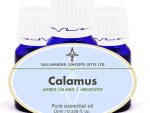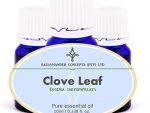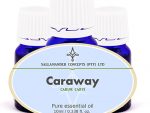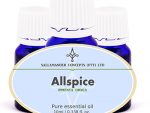Bergamot (expressed) essential oil Information
Bergamot essential oil is extracted from the tree Citrus aurantium var. bergamia (also known as C. bergamia), of the Rutaceae family and is also known as Bergamot orange.
Properties of Bergamot essential oil
The scent of the oil is basically citrus, yet fruity and sweet, with a warm spicy floral quality and is reminiscent of neroli as well as lavender oil. The color ranges from green to greenish-yellow and the oil has a watery viscosity.
Origin of Bergamot essential oil
This tree is native to South East Asia, but was introduced to Europe, and particularly Italy. It is also found in the Ivory Coast, Morocco, Tunisia and Algeria.
Bergamot oil is made from a tree that can grow up to four meters high, with star-shaped flowers and smooth leaves, bearing citrus fruit resembling a cross between an orange and a grapefruit, but in a pear-shape. The fruit ripens from green to yellow.
The oil is one of the most widely used in the perfumery and toiletry industry and forms, together with neroli and lavender, the main ingredient for the classical 4711 Eau-de-cologne fragrance. It is used to flavor Earl Grey tea. The name is derived from the city Bergamo in Lombardy, Italy, where the oil was first sold.
Extraction of expressed Bergamot essential oil
The rind of both ripe and unripe fruit is used to extract the oil by expression, which yields about 0.5 %.
Note: Bergamot essential oil is also distilled and the distilled oil does not contain bergapten and FCF’s (Furocoumarins or Furanocoumarins)
Typical chemical composition of Bergamot essential oil
The essential oil is composed of various chemical constituents and includes a-pinene, myrcene, limonene, a-bergaptene, b-bisabolene, linalool, linalyl acetate, nerol, neryl acetate, geraniol, geraniol acetate and a-terpineol.
Therapeutic Properties of Bergamot essential oil
The therapeutic properties of Bergamot essential oil include analgesic, antidepressant, antiseptic, antibiotic, anti-spasmodic, stomachic, calmative, cicatrisant, deodorant, digestive, febrifuge, vermifuge and vulnerary.
Suggested precautions regarding Bergamot essential oil
An allergic reaction to Expressed Bergamot essential oil will cause burns if used on skin that is then exposed to sunlight or UV rays. This will happen if the Bergamot oil is used undiluted or is not properly diluted. The high content of bergapten (containing Furocoumarins) can cause photo-toxicity. If the skin has been fully covered before exposure, this allergic response should not occur, but it is best to be extremely cautious.
The concentration of expressed bergamot essential oil should not exceed 0.4% in a blend, if the treated skin is going to be exposed to the sun or UV rays.
Please remember that a sunbed or a sunlamp also gives out UV rays and that you should avoid exposing skin that has been treated with a high dilution rate of expressed bergamot essential oil to any form of UV ray.
Distilled Bergamot essential oil does not contain Furocoumarins (FCF’s) and therefore does not cause photo-toxicity.
Please read our page with heading: Safety with Essential Oils before using this oil.
We recommend the following book as an excellent resource regarding safety:
Essential Oil Safety: A Guide for Health Care Professionals by Robert Tisserand & Rodney Young (#ad)
Uses of expressed Bergamot essential oil
Expressed Bergamot essential oil can be used in the treatment of depression, stress, tension, fear, hysteria, infection (all types, including skin), anorexia, psoriasis, eczema and general convalescence.
In vapor therapy, bergamot oil can be used for depression, feeling fed-up, respiratory problems, colds and flu, PMS and SAD.
It can be used in a blended massage oil, or diluted in a bath to assist with stress, tension, SAD, PMS, skin problems, compulsive eating, postnatal depression, colds and flu, anxiety, depression, feeling fed-up and anorexia nervosa.
As a constituent in a blended base cream or gel, bergamot oil can be used for wounds and cuts, psoriasis, oily skin, scabies, eczema, acne, cold sores as well as chicken pox.
Suggested dilution rates for expressed Bergamot essential oil
On the skin
Skin that will be exposed to the sun before a full wash and rinse – regardless of age:
- Do not apply neat or undiluted
- Dilute to a maximum dilution rate of 0.4% before application
Adult unbroken skin that will NOT be exposed to the sun or any UV rays (sunbed/sunlamp etc) before a full wash and rinse of the skin
Face: 0,2% to 1.5%
Body: 1.5% to 3% (make sure that all exposed parts are well covered before going out in the sun/wash and rinse off)
Bath: 1% to 4%
3 to 24 months: unbroken skin that will NOT be exposed to the sun or any UV rays (sunbed/sunlamp etc) before a full wash and rinse of the skin:
Face: 0.1% to 0.4%
Body: 0.1% to 0.4%
Bath: 0.1% to 0.4%
2 to 6 years – unbroken skin that will NOT be exposed to the sun or any UV rays (sunbed/sunlamp etc) before a full wash and rinse of the skin:
Face: 0.4% to 1.5%
Body: 0.4% to 2%
Bath: 0.4% to 2%
6 to 15 years – unbroken skin that will NOT be exposed to the sun or any UV rays (sunbed/sunlamp etc) before a full wash and rinse of the skin:
Face: 0.4% to 1.5%
Body: 0.4% to 3%
Bath: 0.4% to 3%
Pregnancy – unbroken skin that will NOT be exposed to the sun or any UV rays (sunbed/sunlamp etc) before a full wash and rinse of the skin
Face: 0.4 to 1.5%
Body: 0.4% to 2%
Bath: 0.4% to 2%
- When in doubt consult your doctor / medical professional before use.
- Most professionals and/or Aromatherapists will always err on the side of safety when giving advise regarding the use of essential oils and oleo resins during pregnancy – This is due to conflicting information available, or the absence of any reliable information.
- Quite a number of Aromatherapists advise that you should avoid essential oils completely while pregnant, specifically during the first trimester. This is a very safe approach but may not be necessary at all.
Breastfeeding: Keep away from the baby while feeding (do not apply to areas that the baby will come in contact with). Rather avoid using while breastfeeding.
General:
- When using for the first time – Always use the lowest dilution rate and build up slowly to the maximum. Stop using all essential oils on the skin if irritation or allergy occurs.
- Any advice or instruction received from a medical professional ALWAYS supersedes recommendations or advice found on this website. When in doubt consult your doctor / medical professional.
Burners and vaporizers
In vapor therapy (2 to 8 drops), bergamot oil can be used for depression, feeling fed-up, respiratory problems, colds and flu, PMS and SAD.
Summary
Fresh smelling Bergamot essential oil is a favorite in aromatherapy and is great for creating a more relaxed and happy feeling, relieving urinary tract infections, boosting the liver, spleen and stomach, while fighting oily skin, acne, psoriasis, eczema, as well as cold sores.
Certain precautions have to be observed when using expressed Bergamot essential oil on the skin, due to the photo-toxic nature of the oil.
Expressed Bergamot essential oil blends well with
Although essential oils blend well with one another, bergamot oil goes particularly well with other essential oils such as Black Pepper, Clary Sage, Cypress, Frankincense, Geranium, Jasmine, Mandarin, Nutmeg, Orange, Rosemary, Sandalwood (Mysore), Vetiver and Ylang-ylang.
